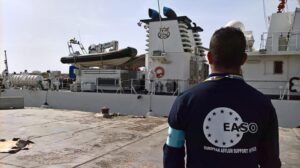In December 2019, the European Asylum Support Office (EASO) signed Operating Plans with the national asylum authorities of Cyprus, Greece, Italy and Malta, following needs-based discussions on the support which the Agency will provide throughout 2020.
Aims for 2020
In 2020, EASO will see its operational deployments double in size, with up to 550 personnel deployed in Greece, 150 in Italy, 120 in Cyprus and 60 in Malta. In addition, interpreters and security personnel will be deployed in the four Member States, bringing the total deployment up to as many as 2,000 personnel. Cyprus, Greece and Malta will all see a doubling of EASO personnel, while operational deployments in Italy will be decreased in light of changing needs on the part of the Italian authorities.
The Greek Operating Plan will see EASO roughly double its personnel in the country, including with almost three times as many caseworkers working in close cooperation with the Greek Asylum Service. EASO personnel will also continue to provide support for reception in the Hotspots and now also in Centres on the mainland, as well as targeted structural support to the Greek authorities on both asylum and reception.
Notably, EASO’s operational presence on the Greek mainland will increase by four times the level of 2019, with personnel being deployed to eight new locations in Thessaloniki and Ioannina to support the country’s regular asylum procedure.
In Cyprus, the number of deployed caseworkers will double in size to at least 60 EASO personnel, while the Agency will be present in 10 locations in the country supporting both registration and the further processing of asylum applications. EASO will also support the establishment of the first line reception centre in Pournara, while the 2020 Operating Plan also includes collaborating with the concerned authorities to develop and implement the entire workflow for new arrivals. EASO will also establish new support for the second instance authorities and continue its support to the Cypriot authorities in terms of reception.
The Operating Plan which was signed with Malta will also see EASO double its support for the national authorities. In addition to increased support for the Maltese services within the asylum procedure, EASO will, for the first time, also provide support in terms of reception. Specifically, EASO personnel will support work on vulnerability through the deployment of Vulnerability Officers and technical support on reception, including age assessment procedures. EASO will not, however, be involved in direct support for the management of reception centres.
In addition, EASO will continue to be ready to support the Maltese authorities with ad hoc disembarkations and voluntary relocations.







Leave a Reply